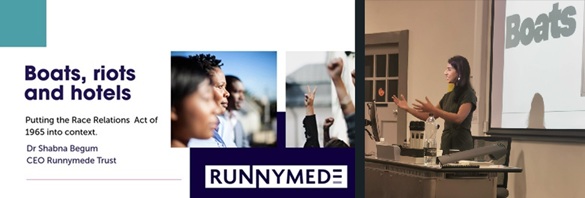The John Hamilton Lifelong Learning Annual Lecture
The John Hamilton Lifelong Learning Lecture celebrates the life and legacy of John Hamilton (1922–2006), a Liverpool teacher and political leader who dedicated himself to widening access to education. Thanks to the fund he left to the University of Liverpool, we have been able to continue his mission: promoting opportunities for working-class people to learn, grow, and shape the future of the City.
The John Hamilton legacy - 2024 and beyond
The John Hamilton Lifelong Learning Lecture was a much-loved annual public event from 2007 to 2017, celebrating a local champion of education whose impact shaped both the University and the wider city. The series has always aimed to deepen our ties with Liverpool’s communities and affirm our commitment to learners from every background.
After a break, the series returned on 30 October 2024 with a relaunch event at FACT Liverpool. Our guest speaker, Professor Beth Johnson (University of Leeds), delivered a compelling talk, “Class Dismissed: Work and Inequalities Behind the Scenes of British TV and Film.”
The 2025 lecture, held on 13 November 2025, featured Dr Shabna Begum, CEO of the Runnymede Trust, who addressed a powerful question: “60 Years Since the First Race Relations Act: How Much Has Changed?”
Read more about the 2025 lecture & view slides and transcript
In 1965 the Labour government passed the country's first 'race relations' law outlawing discrimination in public amenities. The law was created in the context of the 1958 racist riots, increasing anxieties around immigration, and the rise of the far right. Fast forward 60 years, we find ourselves confronting issues that feel not too dissimilar. The racist riots of summer 2024 mark the culmination of the increasing normalisation of anti-migrant, and anti-asylum rhetoric and the intensification of Islamophobia as well as the deepening of many structural forms of racism. This coincides with the cost-of-living crisis which may have disappeared from headlines but remains a punishing factor in the lives of so many. At this 60 year juncture, it is timely to revisit who 'we' imagined we were when we passed the first Race Relations Act and who we now imagine 'us' to be.
Dr Shabna Begum is CEO of the Runnymede Trust and was Director of Research there before her current post. Her leadership has been at the heart of all the Runnymede Trust’s recent projects, including research on education including art education, police in schools, and more broadly around the cost-of-living crisis, the experiences of women of colour in the workplace, and racism in migration debates, and most recently Islamaphobia.
We apologise that, due to a technical problem, the video recording of the event failed, but we are able to share the presentation slides and the full transcript from the event. Link below:
John Hamilton Lecture 13 November 2025 Transcript and Slides
Read more about the 2024 lecture & watch the video
Dr Mark O'Brien, Student Experience & Enhancement Directorate, reported:
Beth’s talk was comprehensive, covering the topics of ‘credit crunch commissioning’, the work of the Policy and Evidence Centre, the ‘What’s On? Rethinking class in the television industry 2023-26’ research project looking into representations of class in television and the media (in partnership with the BBC and Channel 4), the research-led film series ‘Industry Voices’ and what the future holds.
Dramatic tropes in television display representations of working life in various ways. In 2014 Channel 4’s Benefits Street was launched onto our television screens, charting the lives of the inhabitants of James Turner Street in Birmingham. Branded as ‘poverty porn’ by a hostile tabloid press, the programme expressed the mood of resentment across the most deprived sections of British society and captured popular narratives about the economic state of the country. Today, BBC 2’s Alma’s Not Normal captures the pathos and humour in the personal and family life of Alma, a working-class woman who aspires to being a successful actor.
Beth talked about research by the national Policy and Evidence Centre that focuses upon the inequalities that continue to mar how class and ethnicity is represented in television and film.
“There are longstanding inequalities in the arts, culture and heritage sectors. It is well known that the workforces and audiences have uneven representations of social classes and ethnic groups.” (Policy and Evidence Centre)
She also shared insights from the ‘What’s On? Rethinking Class in the television industry 2023-6’ research project being undertaken in partnership with Channel 4, the BBC and Candour Productions (Leeds). This work, addressing the questions ‘Who produces television drama?’, ‘What is made?’, and ‘How is class represented and understood?’ uses network ethnographies, fieldwork interviews, textual analysis and audience analysis and data to reveal insights into the interactions of representation, production and reception.
And finally in Industry Voices, Beth shared the recorded testimonies of those working in the UK screen industries, telling their stories of having to struggle against barriers connected to their identity characteristics to find their place in an industry that often keeps them in the wings.
This was a compelling lecture, with important insights into the ways in which our television and film industries continue to reproduce social inequality.
Thank you to Professor Johnson.
Past events - 2007-17 lecture series
• 2012 lecture. 'Being Human. Becoming a Person'. Speaker: Steven Rose
• 2013 lecture. ‘Inequality: the enemy between us’. Speaker: Kate Pickett.
• 2014 lecture. ‘Art Galleries Should Be More Like Newspapers’. Speaker: Bob and Roberta Smith
• 2016 lecture. 'Leaving Reality: The UK and the rest of Europe'. Professor Danny Dorling
Contact johnhamiltonlectures@liverpool.ac.uk to find out more and to receive updates on our public lectures.